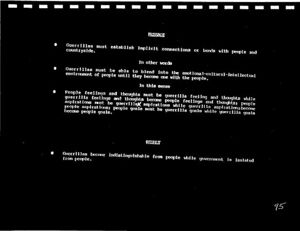Patterns of Conflict
| The works of |
| Works of John Boyd |
|---|
OODA WIKI Edition
Quantico Transcription
You must build up those implicit connections and bonds with people in the countryside. In other words, you must be able to blend in with the emotional-cultural-intellectual environment of the people until they become one with the people.
You’ve become part of the seam, so to speak. Why do you want to do that? Let’s just stop right there. Why do you want to do that? What are you doing that for? To show I’m a good guy? No. What are you really doing that for?
Audience: [unintelligible]
Boyd: That’s right. You’re trying to establish the bonds and build up those bonds of trust so you
can work with them and they’re on your side, not on the other side. That’s exactly right.
And if you’re standoffish, if you’re living in your culture and they’re living in theirs, it’s never going to happen. You’re a stranger and they’re going to treat you like a stranger. [30:00] And there’s mistrust all the way, period.
And that’s why it was so important to have those CAP teams inside the villages, working with the people, building up those bonds, so you can play the game instead of running off doing search and destroy. That’s why they should’ve been in the village instead of attacking the village, like I said in the central scene in that movie Platoon.
I looked at that, and I said there it is. That’s how we lost— soon as I saw that, I said now I know why we lost. I thought it was beautiful. There’s the message why we lost the war. We’re attacking the very people we’re trying to defend.
So then in this sense, peoples’ feelings and thoughts must be guerrilla feelings and thoughts, et cetera, et cetera, et cetera. And those people who read Silence Was a Weapon, didn’t Herrington bring that out very clear? I thought he was very clear on that issue. He might not’ve used exactly these words, but he said that.
The result— incidentally, there’s a good book out. I don’t think it’s any longer in print, but there’s a book called Guerrilla Strategies by Chaliand.[1] If any of you people can get a copy— anybody read Chaliand’s book Guerrilla Strategies? Really, it’s a first-rate book.
Wyly: It’s in the library now.
Boyd: Yeah, it’s first-rate. So the result, the guerrillas become indistinguishable from the people, while the government is isolating from people. That’s exactly what happens then.
Lightfoot Transcription
- ↑ 38 Gerard Chaliand, ed., ''Guerrilla Strategies: An Historical Anthology from the Long March to Afghanistan'' (Berkeley, CA: University of California Press, 1982).
